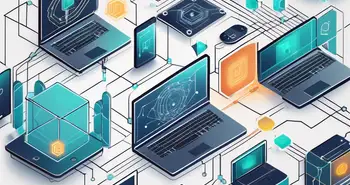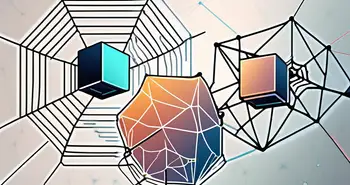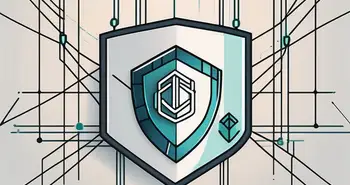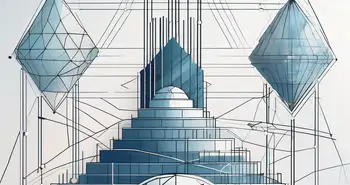Exploring the Connection Between Blockchain and AI

As an expert in the field of technology, I have always been fascinated by the potential of both blockchain and artificial intelligence (AI). These two innovative technologies have made a significant impact on various industries, and their convergence holds even greater promise for the future. In this article, we will dive deep into the connection between blockchain and AI, with a focus on understanding the basics of both technologies, exploring their intersection, and examining their real-world applications.
Understanding Blockchain Technology
Before we explore the connection between blockchain and AI, it is crucial to have a solid understanding of blockchain technology itself. At its core, blockchain is a decentralized digital ledger that records transactions across multiple computers. The data stored on a blockchain is immutable, transparent, and secure, thanks to the use of cryptographic algorithms.
Blockchain technology has gained immense popularity due to its ability to provide transparency, eliminate the need for intermediaries, and enhance data security. Its applications extend beyond cryptocurrencies, with industries like supply chain management, healthcare, and finance exploring its potential.
The Basics of Blockchain
To comprehend the intricacies of blockchain technology, one must grasp the basic principles that govern its functionality. Blockchain consists of blocks, which contain a list of transactions, linked together in a chronological order. These blocks are verified and added to the blockchain through a consensus mechanism, such as proof-of-work or proof-of-stake.
The decentralized nature of blockchain ensures that no central authority has control over the data stored within it. This decentralization, coupled with the immutability of the data, makes blockchain highly secure and resistant to tampering.
The Role of Blockchain in Data Security
Data security is a paramount concern in our interconnected world, and blockchain technology provides a robust solution to this problem. By using cryptographic techniques, blockchain ensures that data stored within its blocks is encrypted and remains secure from unauthorized access or modification.
Furthermore, the decentralized nature of blockchain eliminates single points of failure, making it highly resilient to hacking attempts. Additionally, the transparency of blockchain allows for the creation of auditable records, which can aid in identifying any malicious activities within a system.
The Evolution of Blockchain Technology
Since its inception, blockchain technology has evolved significantly. The first generation of blockchain technology, which Bitcoin introduced, primarily focused on facilitating peer-to-peer transactions. However, subsequent iterations, such as Ethereum, expanded the capabilities of blockchain by enabling the execution of smart contracts.
Today, we are witnessing the emergence of third-generation blockchains, such as Cardano and Polkadot, which aim to address scalability, interoperability, and sustainability challenges. These advancements in blockchain technology pave the way for a more efficient and versatile infrastructure that can support complex applications, including AI.
Unpacking Artificial Intelligence
Now let's turn our attention to artificial intelligence (AI), another groundbreaking technology that has revolutionized various industries. AI refers to the simulation of human intelligence in machines, enabling them to perform tasks that typically require human cognitive abilities, such as learning, problem-solving, and decision-making.
Defining Artificial Intelligence
Artificial intelligence encompasses a wide range of techniques, including machine learning, natural language processing, and computer vision. These techniques empower machines to analyze vast amounts of data, identify patterns, and make predictions or decisions based on the insights gathered.
The applications of AI are extensive, spanning industries such as healthcare, finance, transportation, and manufacturing. From diagnosing diseases to detecting fraudulent transactions, AI has demonstrated its transformative potential in improving efficiency and enabling innovative solutions.
The Impact of AI on Various Industries
Across industries, AI has made significant strides in streamlining operations, enhancing productivity, and driving innovation. In healthcare, AI-powered systems can assist doctors in diagnosing diseases, predict patient outcomes, and personalize treatment plans.
In finance, AI algorithms are employed for fraud detection, algorithmic trading, and credit risk assessment. These applications not only improve security but also enable faster and more accurate decision-making in the financial sector.
The manufacturing industry has also witnessed the integration of AI in robotic systems, enabling automation and optimization of production processes. AI-powered robots can perform complex tasks with precision and adapt to changing circumstances, leading to improved productivity and reduced costs.
The Future of AI: Predictions and Possibilities
Looking ahead, the future of AI holds immense promise. Advancements in AI research and development continue to push the boundaries of what is possible. With the advent of deep learning and neural networks, AI models have become increasingly sophisticated, capable of learning and evolving from data in ways that were previously unimaginable.
In the coming years, we can expect AI to play a more prominent role in our daily lives, from virtual assistants that understand and respond to natural language to self-driving cars that navigate our roadways autonomously. The potential applications of AI are vast, and its impact is set to penetrate fields ranging from education to entertainment.
The Intersection of Blockchain and AI
Now that we have explored the fundamental aspects of blockchain and AI individually, let us delve into their intersection and discover how these two technologies complement each other.
How Blockchain and AI Complement Each Other
Blockchain and AI have distinct strengths that, when combined, can unlock new possibilities. Blockchain's transparency and immutability improve the reliability and trustworthiness of AI systems. By storing training data, AI models, and their outputs on the blockchain, the process becomes transparent and auditable, addressing concerns related to bias, privacy, and trust.
Additionally, blockchain technology can provide secure and decentralized marketplaces for AI models and data. This empowers individuals and organizations to securely exchange valuable AI assets, fostering collaboration and innovation while ensuring data privacy and ownership.
The Potential of Blockchain-AI Integration
The integration of blockchain and AI has the potential to revolutionize industries such as healthcare, finance, and supply chain management. In healthcare, blockchain can enhance data interoperability, enabling secure and privacy-preserving sharing of sensitive patient information among healthcare providers while leveraging AI to analyze this data for improved diagnostics and treatment outcomes.
In finance, the integration of blockchain and AI can facilitate decentralized lending platforms, algorithmic trading with secure and transparent audit trails, and risk assessment models driven by diverse datasets.
Supply chain management stands to benefit from the combination of blockchain and AI by enhancing traceability, transparency, and efficiency. AI algorithms can leverage data recorded on the blockchain to optimize supply chain logistics, detect counterfeit products, and reduce waste.
Challenges in Merging Blockchain and AI
While there is great potential in merging blockchain and AI, it is not without its challenges. One significant obstacle is the scalability of blockchain, as it currently struggles to handle the vast computational requirements of AI algorithms.
Another challenge lies in ensuring privacy while utilizing AI on the blockchain. Striking the right balance between transparency and confidentiality is crucial to protect sensitive data. Moreover, establishing standards for interoperability and consensus mechanisms that align with the needs of AI systems will be vital to fostering a cohesive ecosystem.
Real-World Applications of Blockchain and AI
Now that we have explored the connection between blockchain and AI, let us look at some real-world applications where these technologies are being leveraged to drive innovation and transformation.
Blockchain and AI in Healthcare
In healthcare, blockchain and AI are revolutionizing patient care and medical research. Blockchain technology enhances data interoperability, enabling secure and efficient sharing of patient records between healthcare providers. AI, on the other hand, can analyze shared data to identify patterns, predict outcomes, and aid in the development of personalized treatment plans.
Additionally, blockchain can help ensure the accuracy and integrity of clinical trial data, enhancing the credibility and reliability of research findings. By incorporating AI into the analysis of clinical trial data, researchers can gain insights faster, accelerating the discovery of new treatments and therapies.
The Role of Blockchain and AI in Finance
In the financial industry, blockchain and AI are disrupting traditional processes and paving the way for innovative solutions. Blockchain technology enables secure and transparent transactions, reducing the need for intermediaries and enhancing the efficiency of payment systems.
AI algorithms, combined with blockchain, are used for risk assessment, fraud detection, and algorithmic trading. These applications enable more accurate and timely decision-making, improving financial security and optimizing investment strategies.
Blockchain and AI in Supply Chain Management
The global supply chain industry faces challenges related to inefficiency, lack of transparency, and counterfeit products. By leveraging blockchain and AI, these issues can be addressed effectively.
Blockchain technology provides a distributed and immutable ledger that enables end-to-end traceability of goods, ensuring transparency and accountability. AI algorithms can analyze the data on the blockchain to optimize supply chain logistics, predict demand, and identify potential bottlenecks.
FAQ
What is blockchain technology?
Blockchain technology is a decentralized digital ledger that records transactions across multiple computers. It ensures transparency, data security, and eliminates the need for intermediaries.
What is artificial intelligence (AI)?
Artificial intelligence refers to the simulation of human intelligence in machines, allowing them to perform tasks that typically require human cognitive abilities, such as learning, problem-solving, and decision-making.
How do blockchain and AI complement each other?
Blockchain's transparency and immutability improve the reliability of AI systems, while AI can enhance the analysis of data stored on the blockchain. The integration of blockchain and AI can lead to more secure, auditable, and efficient systems.
What are some real-world applications of blockchain and AI?
In healthcare, blockchain and AI are used to improve patient care and medical research. In finance, these technologies enhance payment systems, risk assessment, and fraud detection. In supply chain management, blockchain and AI optimize logistics and ensure transparency.
What challenges exist in merging blockchain and AI?
Challenges in merging blockchain and AI include scalability, privacy concerns, and standardization. Ensuring that blockchain can handle the computational requirements of AI algorithms and striking a balance between transparency and privacy are essential for successful integration.
Overall, the connection between blockchain and AI holds immense potential. As both technologies continue to advance, their convergence will undoubtedly lead to groundbreaking innovations, revolutionizing industries and creating new possibilities for the future. Embracing this synergy is crucial for organizations to stay competitive in the rapidly evolving technological landscape.
As an expert in the field, I have witnessed firsthand the transformative impact that blockchain and AI can have on our society. It is essential for individuals, businesses, and policymakers to stay informed and embrace the opportunities presented by these technologies. By doing so, we can harness their full potential and shape a future that is both technologically advanced and ethically sound.
As we embrace the synergies between blockchain and AI, it's clear that the future of trading and investing is also being reshaped by these technologies. Morpher is at the forefront of this transformation, offering a revolutionary trading platform built on blockchain technology. With zero fees, infinite liquidity, fractional investing, and the safety of a non-custodial wallet, Morpher is democratizing trading for investors around the world. Whether you're interested in stocks, cryptocurrencies, forex, or even niche markets like NFTs, Morpher provides a unique, user-centric trading experience. Ready to be part of the future of investing? Sign Up and Get Your Free Sign Up Bonus today and join the Morpher community!

Disclaimer: All investments involve risk, and the past performance of a security, industry, sector, market, financial product, trading strategy, or individual’s trading does not guarantee future results or returns. Investors are fully responsible for any investment decisions they make. Such decisions should be based solely on an evaluation of their financial circumstances, investment objectives, risk tolerance, and liquidity needs. This post does not constitute investment advice.

Painless trading for everyone
Hundreds of markets all in one place - Apple, Bitcoin, Gold, Watches, NFTs, Sneakers and so much more.

Painless trading for everyone
Hundreds of markets all in one place - Apple, Bitcoin, Gold, Watches, NFTs, Sneakers and so much more.









